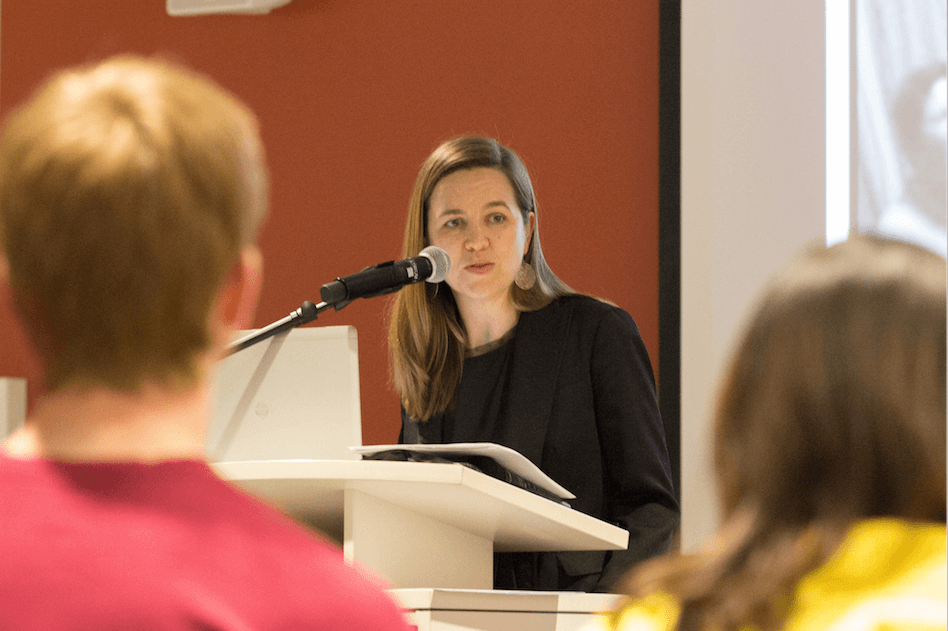by The Cowl Editor on April 26, 2018
Opinion

Human trafficking, despite the average American’s stereotypical assumptions of faraway lands and impoverished regions, is a problem in America. President Trump would not have signed a measure limiting online sex trafficking only two weeks ago otherwise. More Americans need to be aware of the insidious danger of human trafficking and the parasitic nature with which it impacts children and teenagers at home and abroad.
Providence College has hosted a number of proceedings spreading knowledge about sexual assault throughout April, which is Sexual Assault Awareness and Prevention Month. These events, which are geared toward education on how to prevent sexual assault in all its forms, are an important first step towards creating increased cognizance in the minds of regular people.
On Tuesday, April 24, Eileen Campbell, the national director of advocacy and mobilization at the International Justice Mission (IJM) and Maria Dias, a human trafficking advocate at Day One, a sexual assault and trauma center, both spoke about the persistent practice of human trafficking.
Despite being a less recognized form of sexual assault, human trafficking impacts millions of people and has debilitating consequences. Campbell spoke about trafficking on a global level and noted that it takes place throughout the world because it is big and easy business. According to IJM’s website, human trafficking generates about $150 billion a year worldwide, two-thirds of which comes from commercial sexual exploitation. Once a young person has been drawn in by a pimp and coerced into prostitution, they often find that there is no way out because of how much they rely on the pimp for basic necessities and food.
The most grotesque factor of human trafficking is that many children are often forced to become sex workers. IJM’s website notes that there are two million children being exploited in the global commercial sex trade. Two million is twice the population of Rhode Island and a disastrous total for children being forced to have sex, contract diseases, and submit themselves to someone else’s greedy lust for money. One child being forced into the sex trade is a tragedy; two million is a mind-boggling affront to humanity.
Human trafficking of young people is more prevalent in America than one might imagine. Day One estimates that there are between 100,000 and 300,000 underage girls being sold as prostitutes in the United States. While these numbers and figures might seem preposterously high, it is likely because underage prostitution is not the way you picture it. A good number of cases, Dias remarked, involve family members pimping their younger female relatives either to support a drug habit or for some other frightening reason. The average age of girls found in trafficking cases at Day One is only 15 years old, indicating that girls get caught at a young age and find it nearly impossible to get out. Dias warned that even seemingly mundane routines like finding a place to sleep at night can become situations in which women are coerced into sex.
Dias also explained why it is difficult to prevent prostitution of young girls in Rhode Island. Because the perpetrators know all the foster homes in such a small state, they are able to easily “recruit” future sex slaves under the guise of adoption. Dias also relayed a memorable anecdote about one pimp using a U-Haul up and down route I-95 for his business. A mobile location and a generic description make such a scheme nearly impossible for the authorities to track down.
Although the situation around human trafficking appears bleak, Campbell provided one major reason for hope. IJM was able to cut down on the number of minors available for prostitution in Cebu, the second largest city in the Philippines, by 79 percent in only 4 years of activism. This statistic should serve as a catalyst for all those who might feel somewhat compelled to do something, because change surely can be made in America as it was in Cebu. It might take as much effort as a phone call to a congressman or as little effort as simple awareness. Either way, the universal problem of human trafficking deserves more of your attention because the girl down the street deserves more for her life.